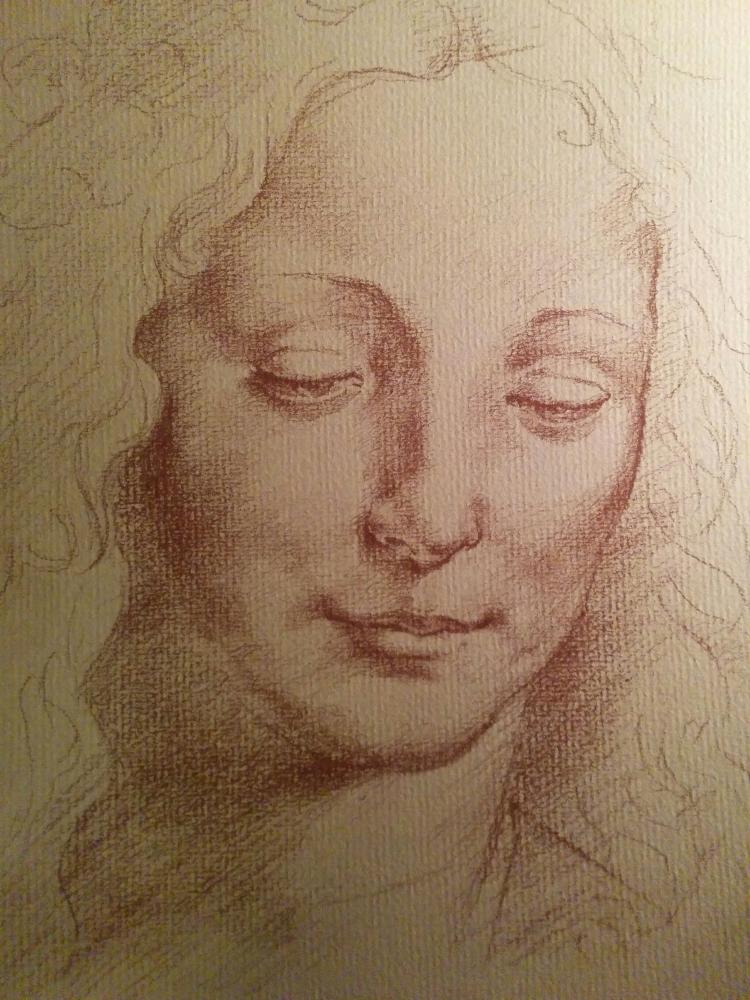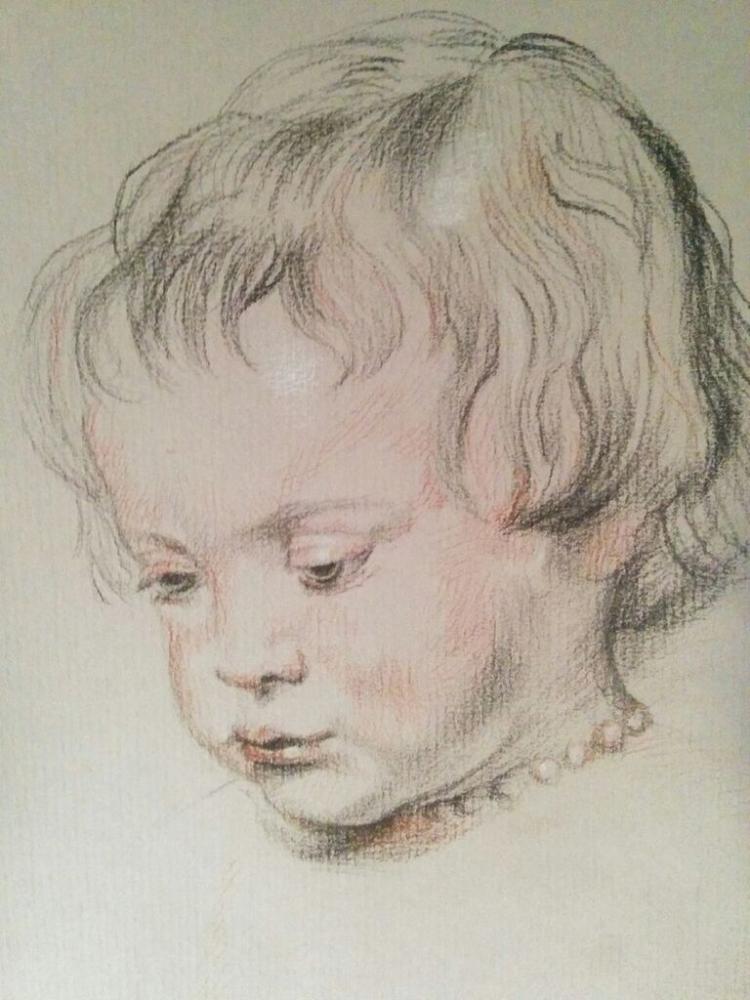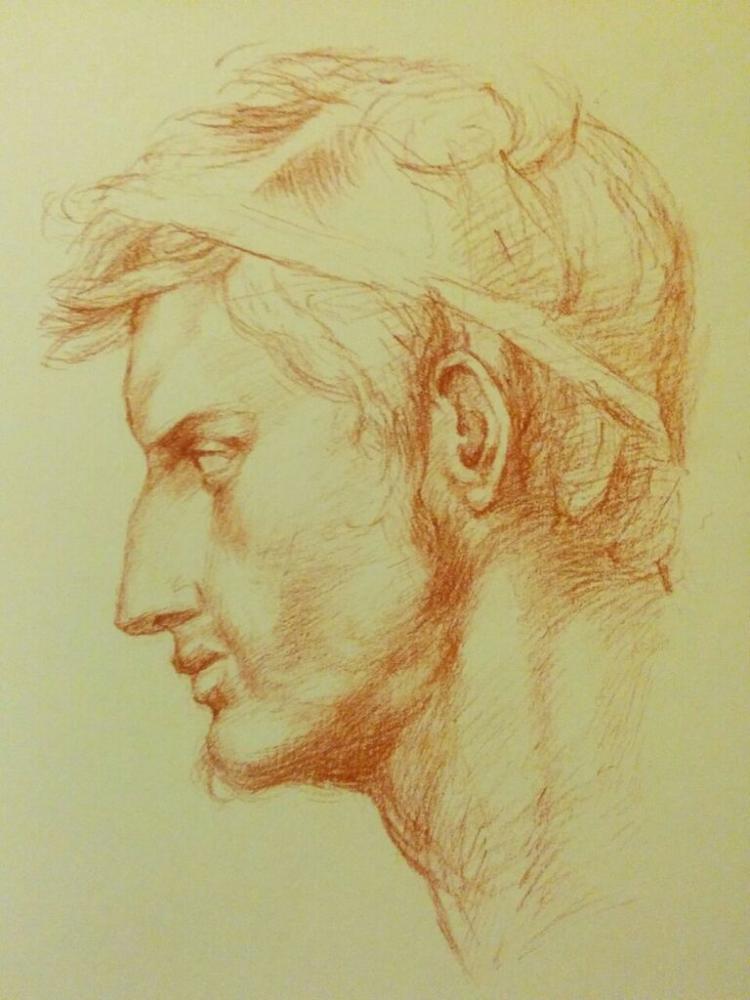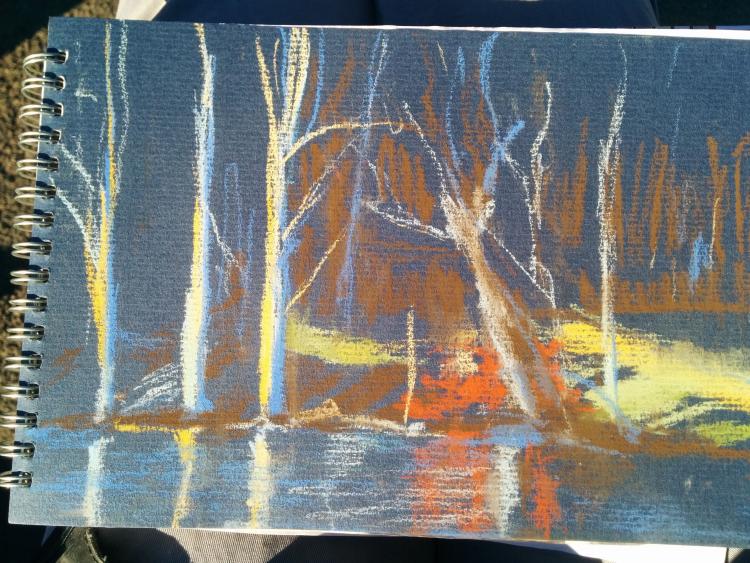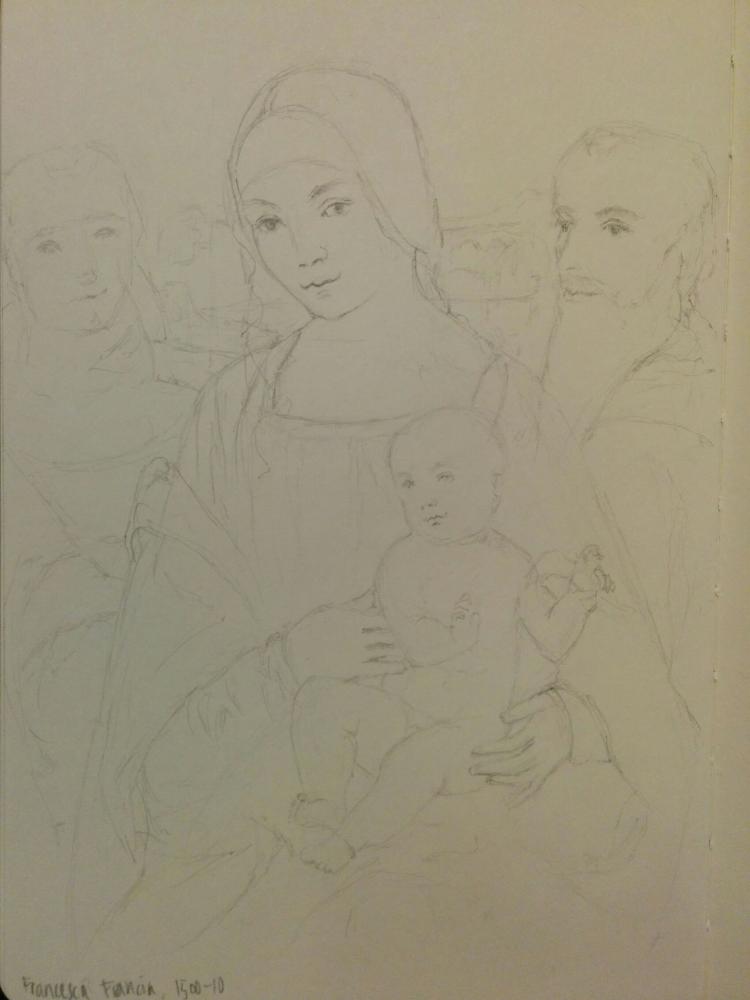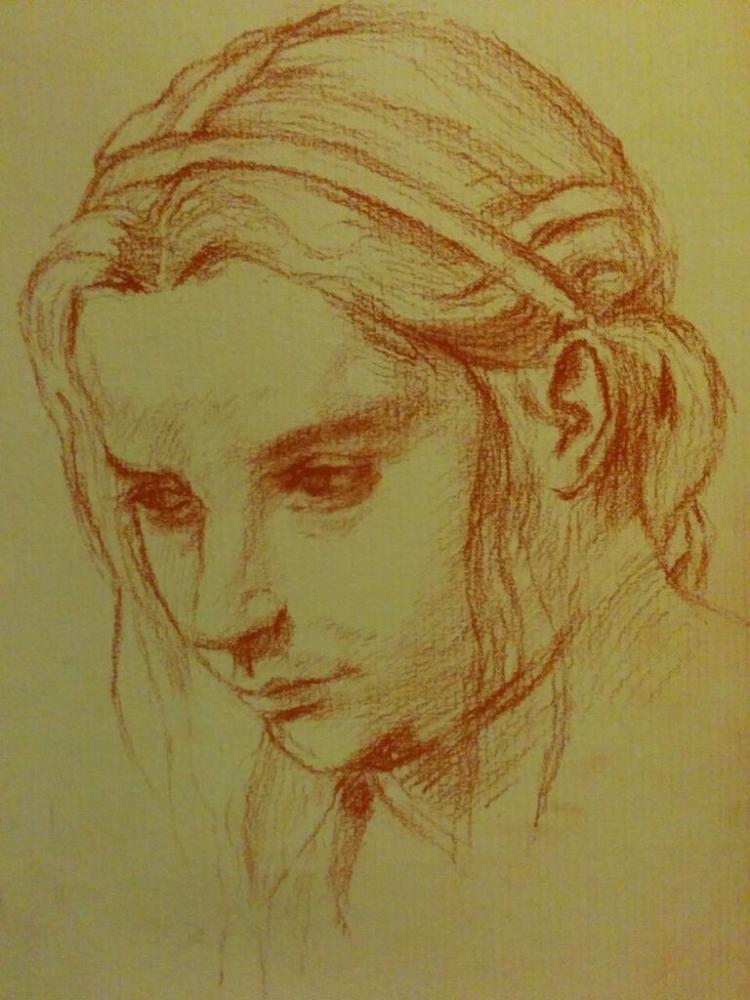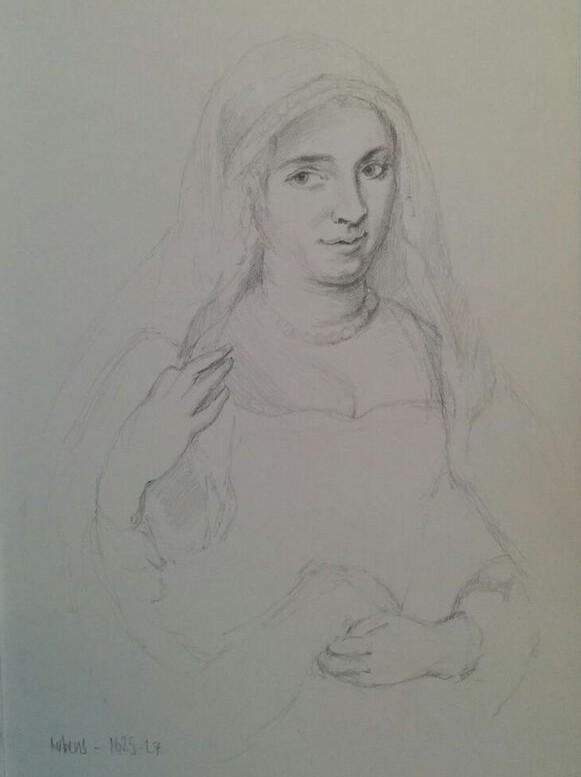It was the last day of the Andrea del Sarto drawings exhibition at the Frick Collection today, so I hopped on a bus and spent the afternoon there. Before getting down to a copy of one of his drawings I spent some time with the permanent collection. I was particularly drawn to Jan van Eyck's Virgin and Child with Saints and Donor. It is rich with the most delicate details, from pearls embroidered on fabric to swans in the distant river to the individually-painted fronds of the rug. You can lose yourself in it and constantly discover something new. Why the curators have decided to place a table in front of their collection's most minutely detailed work is beyond me. It needs close inspection to enjoy properly.
I worked in front of Andrea del Sarto's Studies of the Head of an Infant (which was on loan from the Uffizi) for about an hour and a half to do today's drawing. I was gratified to receive lots of compliments and an offer to buy it. The grave risk of this is that I get so excited over such minor success that I forgive myself all of the errors and begin to think it is good. I had to stop and actually just look at the original to see how unapproachable it is from mine. All of the softness and sweetness of expression is lost in my attempt, and the technique is crude to say the least. His marks are so fluent, unerring. One of the big benefits of copying a master is you gain a first-hand knowledge of how hard the problems he solved were, and through the labour you gain a new type of respect for his genius.
To make up for yesterday's abortive attempt at a delicate drawing I went out and bought some oil pastels and more toned paper so I could do a Degas' Woman combing her hair, which is much less demanding in terms of drawing. I maintain that he can't draw, and that his technical ability is achievable, but it his sense of light and colour and his ability to capture life and movement that is worthy of emulation. I had great fun working in colour with the thick, buttery oil pastels and am pleased with the result. I saw a similar one at the Met recently, and it has been haunting me. It is so simple, so easy to achieve, yet it is memorable, tender. I didn't want to love it, but I think I do.
I went to Scandinavia House today to see an exhibition of an artist formerly unknown to me -- Vilhelm Hammershøi. His work is quiet, sombre, contemplative, and united by his limited and muted palette. It made me realise that having an identifiable style is probably a selling point for an artist. I have no idea what my style is, not least because I spend so much time copying other people. This may have to change and as soon as I feel I have something to express of my own I'll get down to some original work. Probably landscape.
I'm feeling so positive about this project; it's great to be producing work, and it fills every day with a bit of purpose.
Finished Proust's The Fugitive today, and now on to the last volume of In Search of Lost Time.
I left today's drawing until too late, so rushed it and made a mess of it. It's another from Andrea del Sarto. I realise I don't have to do a finished piece every day and will slow down rather than rush through and not learn anything.
Very conscious of how quickly time is passing. Minutes then hours just slip away, especially when I'm listening to an audiobook and playing Tetris... which I know I shouldn't be doing. Should at least be drawing not mindlessly playing a game.
I'll be on a flight home in three weeks, and being conscious of my limited time I feel guilty when I don't go out and squeeze the most of the day. Not least because I've paid to be here. Today I just worked. This involved not working but not going out, feeling guilty for not at least enjoying myself, then finally getting down to a stroke of work in the evening when I no longer had the possibility of going out and enjoying myself; a pattern I endlessly repeat to no benefit whatsoever. I still can't master myself to get the work done first and enjoy myself as a reward.
Here's Proust from the second in the book on the inability to work (that is, to write):
If only I had been able to start writing! But whatever the conditions in which I approached the task (as, too, alas, the undertakings not to touch alcohol, to go to bed early, to sleep, to keep fit), whether it were with enthusiasm, with method, with pleasure, in depriving myself of a walk, or postponing my walk and keeping it in reserve as a reward of industry, taking advantage of an hour of good health, utilising the inactivity forced on me by a day of illness, what always emerged in the end from all my effort was a virgin page, undefiled by any writing, ineluctable as that forced card which in certain tricks one invariably is made to draw, however carefully one may first have shuffled the pack. I was merely the instrument of habits of not working, of not going to bed, of not sleeping, which must find expression somehow, cost what it might; if I offered them no resistance, if I contented myself with the pretext they seized from the first opportunity that the day afforded them of acting as they chose, I escaped without serious injury, I slept for a few hours after all, towards morning, I read a little, I did not over-exert myself; but if I attempted to thwart them, if I pretended to go to bed early, to drink only water, to work, they grew restive, they adopted strong measures, they made me really ill, I was obliged to double my dose of alcohol, did not lie down in bed for two days and nights on end, could not even read, and I vowed that another time I would be more reasonable, that is to say less wise, like the victim of an assault who allows himself to be robbed for fear, should he offer resistance, of being murdered.
Marcel Proust, The Guermantes Way
Once again I have butchered the incomparable beauty and subtlety of a master drawing. Today's is a copy from Leonardo's study of a female head. I should like to return to some of these studies as the project progresses and see if I can improve on them.
Today feels like one of those days that I will look back on with fondness. With the distance of memory I will forget how tired I was and remember rather the trip to the Met to look at the impressionists, the walk in the park and the pleasure of learning from Leonardo. I woke early to do a stroke of work, and I'm astonished at how much of the day there is before lunch.
I finished Proust's The Captive, and I'm half-way through The Fugitive. I am in love with his self-awareness and sincerity, and I am devouring his work with a keenness I haven't felt for many other authors. I wish I could read it in French.
I had the happy accident of uniting art and Proust through Renoir's portrait of Madame Georges Charpentier which I saw at the Met today. As I have mentioned before, it was nice to see something in person that he would have stood in front of in person as well. Who knows how many great people paintings have seen in their history?
“To succeed thus in gaining recognition, the original painter or the original writer proceeds on the lines of the oculist. The course of treatment they give us by their painting or by their prose is not always pleasant. When it is at an end the practitioner says to us: “Now look!” And, lo and behold, the world around us … appears to us entirely different from the old world, but perfectly clear. Women pass in the street, different from those we formerly saw, because they are Renoirs, those Renoirs we persistently refused to see as women.”
Marcel Proust, The Guermantes Way
There is so much art in Proust's work, such a sensitivity for the visual. It feels like a perfect synthesis to listen to his work whilst drawing.
The tyranny of money, the repugnance of work. I want to devote myself completely to reading and drawing and thinking and yet every so often the exigencies of daily life get in the way.
I read about Proust and Tolstoy and identify with them and their characters, forgetting that whilst I may have all of their youthful indolence, lack of self-discipline and reckless extravagance, I differ from them in one critical aspect: I lack a considerable inheritance.
And so I am continually wrenched from the airy heights of dilettantism to the sordid daily grind so I can get the money I need to whisk me around the world to bombard myself with distractions from the various existential angsts and adult responsibilities that loom.
I despise it, I despise work channelling my thoughts away from me, leaching my energy from me and diverting it to tasks of invariable meaninglessness. With my pathologically high opinion of myself I feel like Marvin, the paranoid android...
"Come on," he droned, "I've been ordered to take you down to the bridge. Here I am, brain the size of a planet and they ask me to take you down to the bridge. Call that job satisfaction? 'Cos I don't." Douglas Adams, The Hitchhiker's Guide to the Galaxy
Or, to put it more poetically:
They told me that I had five senses to enclose me up;
And they enclos’d my infinite brain into a narrow circle,
And sunk my heart into the Abyss, a red, round globe, hot burning,
Till all from life I was obliterated and erasèd.William Blake, Visions of the Daughters of Albion
I can't bring myself not to resent it, even though I need the money and I should be grateful for the work. I can't shake the awareness that for some people money is not, nor ever will be, a problem. I know Tolstoy renounced his worldly possessions, but that's easy enough to do once you've already spent years having fun squandering them. I am considering the same pattern; dissipate what remains of my youth and burn through my little all to become a hermit living on the breadline.
Today I copied Rubens' drawing of Nicolaas Rubens wearing a coral necklace.
Look at the quality of the lines in this Study for the Head of Julius Caesar by Andrea del Sarto. Such fine, controlled draughtsmanship is incredibly difficult to match and I am beginning to understand quite how much thought goes in to each stroke. When I draw, at least half of what I am doing is automatic, unthinking and undisciplined. This is where I show my amateurism and why I still can't capture likenesses. I see that more mental effort is required, more control and more awareness of what one is trying to achieve. Make every mark count.
A beautiful day but bitterly cold. I did a plein-air sketch in the park with some chalks. It only took a few minutes but I regret it because I have spent the rest of the day recovering from the chill. Nice to work in colour though. I had the intention of going to look at the impressionists afterwards, but as I only had a short while today I decided to save them up for another day.
Instead I returned to a painting by Francesco Francia which has stayed with me for the last few days. It is so serene, with such a tender Madonna and a tranquil landscape in the background that I can't help but feel relaxed when I see it. I took an hour or so to sketch it.
I also took some time to appreciate the detail of the northern artists, and I particularly enjoyed discovering Joos van Cleve, who renders some rather sumptuous fabrics in his annunciation and on Catherine in his crucifixion triptych, using the most minutely small strokes of a tiny brush. Hard not to admire such intense patience and control, like the Dutch landscapists who painted all the leaves on their trees.
I went to the Frick Collection for the first time today. It was a surprisingly emotional experience for me, and I now understand how someone could suffer from Stendhal syndrome and be completely overwhelmed by works of art.
I hadn't expected the collection to be of such high quality nor so beautifully presented. I loved how it wasn't arranged by era, so that a Turner shines out just a few paintings down from a moody Rembrandt.
I was particularly moved to see such a large holding of Gainsboroughs and a Constable, as these two artists have personal significance for me since we all grew up in the same part of rural Suffolk. It felt strange to be together with them so far from home in a mansion off Fifth avenue. Constable would be pleased to be a displayed just a room away from Ruisdeal, a master of landscape from whom he learned a lot.
There was a fantastic exhibition of Andrea del Sarto's drawings. As he is known as Andrea 'senza errori', or Andrea the faultless, there is an awful lot for a novice draughtsman to learn from him. Most of the drawings were in red chalk and I was able to spend an hour or so working in front of his Study of a head of a young woman, from the Uffizi.
My face, my moon, my everybody's moon,
Which everybody looks on and calls hisRobert Browning, Andrea del Sarto. Audio version on youtube.
I finished listening to the audiobook of Sodom and Gomorrah today. I've loved having Proust in my life for the past few months, and I'm so glad I've got three more books of Remembrance of Things Past left to enjoy. Like Tolstoy's War and Peace, books of this length and magnitude completely envelop me and take over my thoughts so that I feel like I am actually living the story, not just reading it.
Proust has again struck a chord with something I have been thinking about a lot in 2015. Towards the end of the book he draws the narrator's attention to how his own growth as a person is framed and contrasted by the unchanging constancy of the physical environments he finds himself in. He changes, the ceiling and bookshelves do not, yet the meanings they hold for him change even though they themselves do not.
"I became aware of my own transformations as I compared them with the identity of my surroundings. We grow accustomed to these as to people and when, all of a sudden, we recall the different meaning that they used to convey to us, then, after they had lost all meaning, the events very different from those of to-day which they enshrined, the diversity of actions performed beneath the same ceiling, between the same glazed bookshelves, the change in our heart and in our life that diversity implies, seem to be increased still further by the unalterable permanence of the setting, reinforced by the unity of scene."
Marcel Proust, Sodom and Gomorrah
It is the same experience as re-reading a book after many years, and it is the same thing as returning to an old, familiar place or seeing a work of art again after a long absence. I love the idea that the selfsame painting, sculpture or building will see me at different points in my life, each time as a changed man. Yet if we moved back the clock the same physical me would be standing in the same place looking at the same thing, occupying the same space. Our relationship each time will be different, yet the work of art will be the same.
That is not to say that I subscribe to the fallacy of art as eternal, but that I think it is eternal enough (i.e. most of it will outlast me).
Reflections on today's drawing
This is again taken from a painting at the Met, which I stood in front of for about an hour today. It is Ruben's Portrait of a Woman, Probably Susanna Lunden. It is a tonal pencil drawing that I enjoyed doing but, as ever, doesn't look anything like the original. I was constantly reminded of Raphael's La Donna Velata, with her beautiful hands emerging from the billowing folds of the veil.
"...that melancholy which we feel when we cease to obey orders which, from one day to another, keep the future hidden, and realise that we have at last begun to live in real earnest, as a grown-up person, the life, the only life that any of us has at his disposal."
Marcel Proust, Sodom and Gomorrah
Proust, like Tolstoy, often seems to echo back to me my own thoughts with greater precision and clarity. I have experienced the liberty of breaking out of the daily grind, ceasing to obey orders and living my own life in earnest and along with it I have also experienced the "melancholy" (or more accurately for me, the anxiety) that Proust sees in this transition.
The anxiety comes from having no-one else to blame but myself when my choices don't deliver what I wanted from them. When I was merely obeying orders, from my parents or from my teachers or from my bosses (or for that matter the implicit orders of societal norms), it felt like my life was governed by external factors and I was absolved of any responsibility for how it turned out or how what I was doing made me feel.
Now I have slowed my life down and attempted to divert all of my energies into the things that I think are most important to me I feel a tremendous pressure to be able to prove to myself I am living the life I should. The trouble is there is no real way of validating this that I can think of. I suppose 'am I happy?' would be a good place to start. That's quite a difficult question because I sometimes feel like I should be happy because I have satisfied so many pre-conditions for happiness, but actually in the moment of asking the question, I am not.
One remedy for this, perhaps, is to busy myself consciously so that I am once more hiding the future from myself, making it a life-choice to be so caught up in contingencies and seemingly unavoidable engagements and commitments (like doing a new drawing every day...) that I don't have time or energy to question whether I am actually using my time wisely or not. This amounts to the same thing that I think most people do through the existential palliatives of work and family life, except this would be a conscious self-deception. I'm not sure it can be completely effective.
Today I don't have a drawing to share; I tried for an hour to re-do that Rembrandt study but it ended up being so repellent that I binned it. I will try again in the morning and will post something here.



